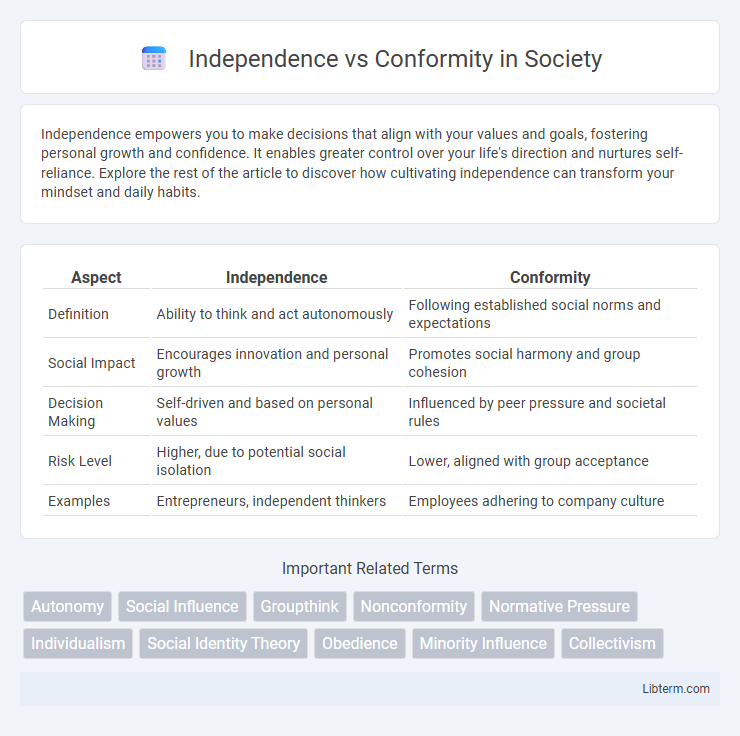Independence empowers you to make decisions that align with your values and goals, fostering personal growth and confidence. It enables greater control over your life's direction and nurtures self-reliance. Explore the rest of the article to discover how cultivating independence can transform your mindset and daily habits.
Table of Comparison
| Aspect | Independence | Conformity |
|---|---|---|
| Definition | Ability to think and act autonomously | Following established social norms and expectations |
| Social Impact | Encourages innovation and personal growth | Promotes social harmony and group cohesion |
| Decision Making | Self-driven and based on personal values | Influenced by peer pressure and societal rules |
| Risk Level | Higher, due to potential social isolation | Lower, aligned with group acceptance |
| Examples | Entrepreneurs, independent thinkers | Employees adhering to company culture |
Defining Independence and Conformity
Independence refers to the ability of an individual to think, act, and make decisions based on personal values and beliefs without external influence. Conformity involves aligning one's attitudes, behaviors, and beliefs to match those of a group or social norms to gain acceptance or avoid conflict. Understanding these concepts highlights the balance between self-expression and social harmony in human behavior.
Historical Perspectives on Social Behavior
Historical perspectives on social behavior reveal that independence and conformity have oscillated as dominant values across cultures and eras, often shaped by political regimes and economic conditions. In Western societies during the Enlightenment, independence became a cornerstone of social philosophy, promoting individual rights and self-expression, whereas many Eastern traditions emphasized conformity to maintain social harmony and collective stability. Research in social psychology and anthropology illustrates how these paradigms influence social structures and interpersonal dynamics, shaping norms that govern behavior and identity formation globally.
Psychological Foundations of Independence
Psychological foundations of independence emphasize self-efficacy, autonomy, and intrinsic motivation as critical components driving individual decision-making and personal growth. Cognitive development theories highlight the importance of secure attachment and identity formation in fostering a sense of independence. Neural mechanisms involving the prefrontal cortex regulate self-control and goal-directed behavior, reinforcing the capacity to resist conformity and assert personal agency.
The Social Dynamics of Conformity
Conformity plays a crucial role in social dynamics by influencing individual behavior to align with group norms, enhancing social cohesion and predictability. The pressure to conform can stem from explicit rules or implicit social expectations, affecting decision-making processes and social interactions. Understanding these dynamics reveals how conformity balances group stability with the potential suppression of individual independence.
Benefits of Embracing Independence
Embracing independence fosters critical thinking, enabling individuals to make autonomous decisions aligned with personal values and goals. It cultivates self-confidence and resilience, empowering people to navigate challenges without relying on external validation. Independent thinking also drives innovation and creativity by encouraging unique perspectives and original solutions.
Risks and Rewards of Conforming
Conforming to social norms can reduce social risks such as rejection or isolation, providing rewards like acceptance, stability, and streamlined decision-making. However, excessive conformity risks suppressing individuality, creativity, and critical thinking, potentially leading to missed opportunities for personal growth. Balancing conformity with independence helps individuals navigate social environments while preserving unique perspectives and innovation.
Independence vs Conformity in the Workplace
Independence in the workplace fosters innovation and empowers employees to take initiative, leading to higher productivity and job satisfaction. Conformity ensures consistency and adherence to company policies, which supports efficient teamwork and minimizes conflicts. Balancing independence and conformity promotes a dynamic work environment where creativity thrives within structured guidelines.
Cultural Influences on Social Choices
Cultural influences shape social choices by promoting either independence or conformity based on societal values and norms. Individualistic cultures prioritize personal autonomy and self-expression, encouraging people to make independent social decisions. In contrast, collectivist cultures emphasize group harmony and social cohesion, leading individuals to conform to community expectations and shared customs.
Striking a Balance: When to Stand Out or Blend In
Striking a balance between independence and conformity requires understanding context and personal values to decide when to stand out or blend in effectively. Embracing independence promotes creativity, innovation, and authentic self-expression, while conforming facilitates social harmony and collective goals. Recognizing situational cues and aligning actions with core beliefs helps navigate the nuanced spectrum between individuality and social acceptance.
Fostering Healthy Individuality in Society
Fostering healthy individuality in society requires balancing independence with social conformity to encourage self-expression while maintaining communal harmony. Emphasizing critical thinking, personal values, and respectful dialogue cultivates a culture where diverse identities thrive without undermining collective norms. Educational programs and social initiatives that promote autonomy and empathy contribute to resilient communities embracing both uniqueness and cooperation.
Independence Infographic

 libterm.com
libterm.com